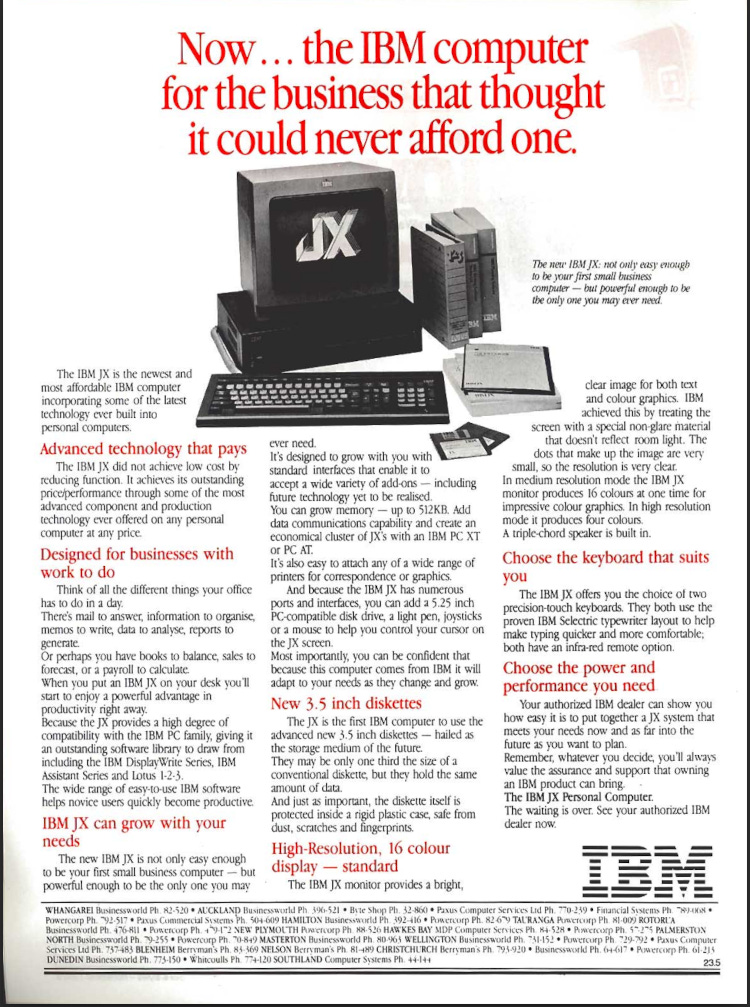

Computer Ads from the Past
source link: https://computeradsfromthepast.substack.com/p/ibm-jx
Go to the source link to view the article. You can view the picture content, updated content and better typesetting reading experience. If the link is broken, please click the button below to view the snapshot at that time.

The Company
IBM is one of those companies that seems like it has been around since the beginning of time. IBM was formed when Bundy Manufacturing Company, Tabulating Machine Company, International Time Recording Company, and Computing Scale Company of America merged in 1911. The oldest of the four companies was founded in 1880.
IBM manufactured and sold a wide range of business equipment. IBM built its first (electromechanical) computer during World War II. Remington Rand introduced the first commercially available computer, named UNIVAC in 1951. A year later, IBM launched the 700 series to compete with it. Within five years, IBM had control of 85% of the market. A UNIVAC executive said, "It doesn't do much good to build a better mousetrap if the other guy selling mousetraps has five times as many salesmen."
In the late 1970s, personal computers exploded on to the scene. IBM entered the market with the IBM PC in 1980. It didn’t take long for the IBM PC to be the standard that other PC makers would follow.
The Computer
IBM Japan released the IBM JX in 1984. The JX was based on the PCjr. The main difference between the two models was “a professional keyboard…, dual 3.5" floppy drives, as well as options for a 5.25" floppy drive and a hard drive, both of which sat atop the main unit”. They were made for IBM by Matsushita Electric Industrial.
William M. Raike wrote the following in the March 1985 issue of Byte magazine:
“As was inevitable, IBM Japan has introduced a new personal computer for the Japanese market. The new machine, called the JX, is not a copy of either the IBM PC or the PCjr, although it incorporates some of their better features and provides some software compatibility to them. The machine is a Japanese product for the Japanese; its price and capabilities reflect its target market.”
Richard Gorham wrote the following in the November 1985 issue of Bits & Bytes:
The arrival of a new Japanese-sou reed: 16 bit micro-computer on the NZ market, with IBM PC "compatibility" and a price tag of under $5000, would not be cause for more than a politely stifled yawn amongst even the most avid of NZ computer buffs.
The reason is that this type of event is no longer "news" — many micro-computers now have those IBM-like credentials.
Why then should I consider the possibility of more than passing interest in "just another clone".
Could it be that the computer under scrutiny here incorporates such features as 3.5 inch hard-cased floppy disk drives, or perhaps the infra-red keyboard, or even the potential availability of all your IBM PC software favourites on cartridge ROM?
I doubt it.
The JX did not perform as well as IBM Japan had hoped. According to Wikipedia, “IBM Japan expected to sell 200,000 units of JX, but only 40,000 units were produced. The JX was discontinued in 1987, and IBM Japan gave 15,000 units of JX to its employees in honor of the company's 50th anniversary.”
If you want to read more about JX, check out these links:
Did you ever use an IBM JX? Tell us about it in the comments below.
Computer Ads from the Past is a reader-supported publication. To receive new posts and support my work, consider becoming a free or paid subscriber.
What computer ads would you like to see in the future? Please comment below. If you enjoyed, please share with your friends and relatives. Thank you.
Recommend
About Joyk
Aggregate valuable and interesting links.
Joyk means Joy of geeK

